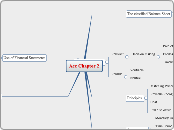par Alain Garrido Il y a 16 années
402
Acc Chapter 2

par Alain Garrido Il y a 16 années
402

Plus de détails
Timeliness
Feedback
Predicted value
Uses
Intercompany comparisons
Single competitor
Industry-average comparisons
Based on average ratios for particular industries
Intracompany Comparisons
Two years for the same company
Type
Solvency Ratios
Survival over a long period of time
Liquidity Ratios
Short-Term ability of the company to pay its obligations and meet unexpected needs for cash
Profitability Ratios
Measure income or operating success in a period of time
Expresed
Proportion
1.44:1
Rate
1.44
Percentage
144%
Mathematical relationship between one quantity and another
Stockholders' Equity
Retained Earnings
Income retained by the firm
Common Stock
Investment of Stockholders
Long-Term liabilities
5 Pension Liabilities
4 Lease liabilities
3 Long-Term notes payable
2 Mortgages Payable
1 Bonds Payable
Pay after a year
Order of Magnitude
Current liabilities
5 Taxes
4 Interest payable
3 Bank loans payable
2 Wages Payable
1 Accounts payable
Obligations to pay in one year or operating cycle
Intangible assets
2 Patents, Copyrights, and trademarks
1 Goodwill
Not physical substance yet often are very valuable
Property, Plant, and Equipment
Assets with long useful lives
- Depretiation
3 Equipment
2 Buildings
1 Land
They spread the total cost to various annual expenses
Long-Term Investments
2 Long-Term assets
Buildings not being used
1 Stocks and Bonds
Investments or assets that held for more than a year
Current Assets
Companies list assets in order they are able to convert it to cash
6 Prepaid Insurance
5 Supplies
4 Inventories
3 Accounts receivable
2 Short-term investments
1 Cash
Convertible in Cash within a year or operating cycle.